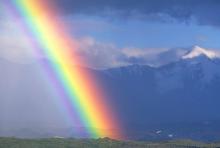In modern life, the act of prayer has been compartmentalized. Those who pray usually only do so at appointed times of ritual. They pray at religious services, before or after meals, on holidays and at life cycle events like weddings and funerals. This is all well and good, but there's also room for what one might call "spontaneous" prayer, little observances throughout the day that can bring spirituality into our regular lives.
Judaism has a functionally limitless variety of prayers, many of which aren't employed on any regular basis. They aren't the ritual prayers of services and other static observances. Rather, they are little markers for rare, sometimes singular occasions that highlight the all-encompassing nature of Jewish philosophy. Judaism is not a faith in a box, separated from the rest of life. In its purest form, it is a way of elevating every individual moment, a spiritual outlook that attempts to frame every instant as another step in a continual process of creation. Consider the following rare prayers.
The Ne'eman Bivrito is the little-known prayer one is meant to say upon seeing a rainbow. In Judaism, rainbows are symbols of the covenant between God and Jews as described in the famous story of Noah and the flood. In the story, God shows Noah the rainbow after the waters had receded as a sign of the promise to never bring the world to destruction again. This tale underlines the inherent symbolism of rainbows themselves. The tumult of storms, times of trouble that they are, is temporary. Clouds always part, the ground dries and the sun shines again. To say a prayer upon seeing a rainbow is to recognize that all troubles eventually fade.
The Shenatan Mikvodo is an especially rare prayer in the 21st century, though it doesn't necessarily have to be. It was originally written to be said upon the infrequent occasion of meeting a king. Though there are few actual monarchs left in this world, the language of the prayer doesn't limit the observance to just crown-wearers. Really, meeting any powerful political leader justifies the recitation of this prayer. It is a recognition of the capacity for flesh-and-blood humans to reflect holy virtues in leadership. This is a blessing of hope that the leader will be wise and benevolent in his or her decisions.
Other prayers are less specific but are also fitting for special, non-ritual moments of life. The two that come to mind first are the Shehekhianu and Oseh Shalom prayers. The former is appropriate for any recognition of the new. A birthday, the first snowfall of the year, the first day at a new job, or any other special event can be marked by the Shehekhianu. The Oseh Shalom is simply a prayer for peace. At any time when one perceives a need for peace or even a moment when peace has triumphed, Oseh Shalom is appropriate.
It is important for Jews to make their faith a part of their daily lives. One is not just a Jew in the synagogue or among other Jews. One is Jew at all times and in all things.
